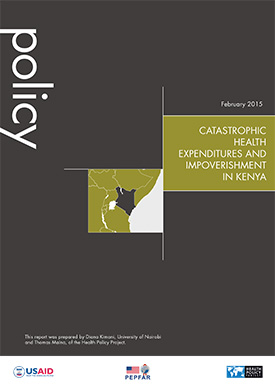The Health Policy Project ended in 2016. Work continued under Health Policy Plus (HP+) until 2022.
PUBLICATION
Author(s): Diana Kimani and Thomas Maina
Primary Language: English
Date: 2/28/2015
Abstract:
Healthcare in many developing countries, including those in sub-Saharan Africa, is predominantly funded through out-of-pocket spending by households. Providing financial protection from exorbitant out-of-pocket expenses is an important tool for a country’s health system to ensure equitable access to care and ensure families are not unnecessarily faced with financial catastrophe and impoverishment. Using data from the Kenya Household Health Expenditure and Utilization Surveys and descriptive analysis, the Health Policy Project, with support from USAID and PEPFAR, estimated the incidence and intensity of catastrophic healthcare expenditure and impoverishment in Kenya in 2003 and 2007. Among other findings, the Catastrophic Health Expenditures and Impoverishment in Kenya analysis revealed that in 2007 an estimated 2.5 million people were pushed below the national poverty threshold as a result of paying for healthcare. Results from this analysis provide strong evidence for the need to implement policies that offer more financial protection to the poor and vulnerable in order to achieve the country’s overall goal of universal health coverage.
Costing Equity Health Financing Report Universal Health Coverage (UHC) Kenya


